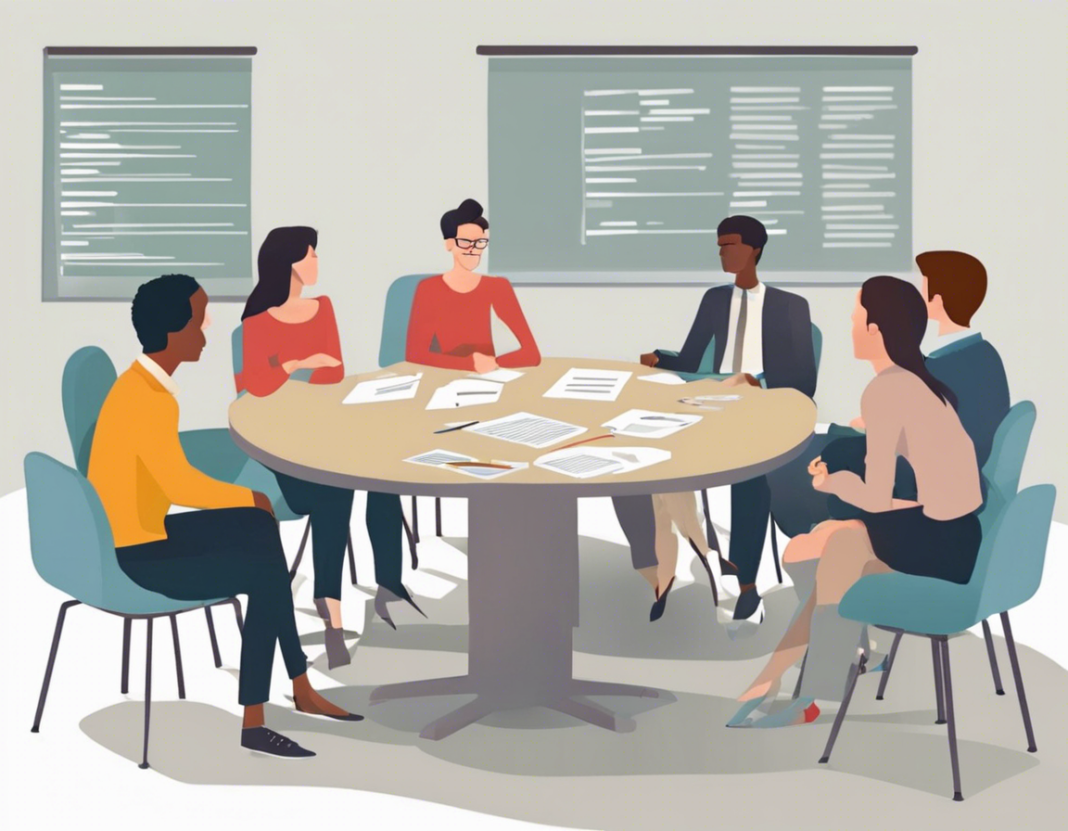Group discussions are a common aspect of academic, professional, and social settings. Whether you are a student participating in a classroom debate, a professional engaging in a team meeting, or an individual involved in a social discussion, knowing how to effectively navigate and contribute to a group discussion is a valuable skill.
Understanding Group Dynamics
Group dynamics play a crucial role in the success of a group discussion. Different individuals bring diverse perspectives, ideas, and communication styles to the table. Understanding and effectively managing group dynamics is essential for a fruitful discussion. Here are some key aspects to consider:
1. Active Listening
Active listening is a cornerstone of effective communication. It involves fully concentrating, understanding, responding, and remembering what is being said. By listening actively, you demonstrate respect for the speaker and ensure that your contributions are relevant to the discussion.
2. Respect and Open-mindedness
Respect for others' opinions is vital in a group discussion. Maintain an open-minded attitude and be willing to consider viewpoints that may differ from your own. Healthy debate can lead to critical thinking and a more comprehensive understanding of the topic at hand.
3. Participation
Participating actively in a group discussion involves striking a balance between speaking assertively and allowing others to express their thoughts. Contribute meaningfully by sharing valuable insights, asking thought-provoking questions, and building on the contributions of others.
4. Collaboration
Collaboration is key to a successful group discussion. Encourage teamwork by fostering a supportive environment where all group members feel comfortable sharing their ideas. Work towards common goals and strive for consensus when making decisions.
Preparation for Group Discussions
Preparation is essential for a successful group discussion. Here are some strategies to help you prepare effectively:
1. Research the Topic
Before the discussion, research the topic thoroughly to familiarize yourself with key concepts, arguments, and viewpoints. Having a solid understanding of the subject matter will enable you to participate actively and contribute meaningfully to the conversation.
2. Organize Your Thoughts
Organize your thoughts and ideas coherently to convey them effectively during the discussion. Structure your arguments logically and anticipate potential counterarguments to strengthen your position.
3. Practice Active Listening and Speaking
Practice active listening and speaking skills to enhance your communication abilities. Engage in mock discussions with friends or colleagues to hone your listening, speaking, and critical thinking skills in a group setting.
4. Set Objectives
Establish clear objectives for the group discussion. Define goals such as problem-solving, decision-making, brainstorming, or information sharing to guide the conversation and ensure that it remains focused and productive.
Strategies for Effective Group Discussion
Implementing the following strategies can help you navigate group discussions with confidence and proficiency:
1. Initiate Meaningful Contributions
Initiate meaningful contributions by asking insightful questions, sharing relevant examples, and offering solutions to challenges. Contribute thoughtfully to the discussion to demonstrate your engagement and understanding of the topic.
2. Facilitate Communication
Facilitate communication by encouraging participation from all group members. Use inclusive language, acknowledge the contributions of others, and ensure that everyone has the opportunity to voice their opinions.
3. Manage Conflicts Constructively
Conflicts may arise during a group discussion due to differing opinions or perspectives. Handle conflicts constructively by listening actively, finding common ground, and seeking mutually agreeable solutions. Respectful disagreement can lead to a richer exchange of ideas.
4. Summarize Key Points
Summarize key points and recapitulate important ideas discussed during the conversation. Synthesize the various contributions to provide clarity and direction to the discussion, ensuring that the group remains focused on its objectives.
Overcoming Challenges in Group Discussions
Despite careful preparation and effective strategies, challenges may arise during group discussions. Here are some common challenges and tips for overcoming them:
1. Dominant Participants
If certain individuals dominate the discussion, facilitate equal participation by encouraging quieter members to share their thoughts. Use techniques such as round-robin discussion or anonymous feedback to ensure that everyone's voice is heard.
2. Off-Topic Discussions
To prevent discussions from veering off-topic, redirect the conversation towards the established objectives. Politely steer the group back to the main points of focus and encourage tangential discussions to be addressed separately.
3. Lack of Engagement
In cases of low engagement, prompt participation by asking direct questions, assigning roles or tasks, and creating opportunities for hands-on activities. Foster a collaborative environment that motivates all group members to actively contribute.
4. Time Management
Effective time management is crucial for a productive group discussion. Allocate time for each agenda item, set clear deadlines for tasks, and prioritize key topics to ensure that the discussion stays on track and achieves its goals within the designated timeframe.
Frequently Asked Questions (FAQs)
1. How do I prepare for a group discussion?
- Research the topic, organize your thoughts, practice active listening and speaking, and set clear objectives for the discussion.
2. How can I contribute meaningfully to a group discussion?
- Initiate insightful contributions, facilitate communication, manage conflicts constructively, and summarize key points for clarity.
3. What should I do if I encounter dominant participants in a group discussion?
- Encourage equal participation, use techniques to ensure everyone's voice is heard, and address dominating behavior diplomatically.
4. How do I handle off-topic discussions during a group conversation?
- Redirect the conversation towards the established objectives, politely steer the group back on track, and encourage separate discussions for tangential topics.
5. What strategies can I use to overcome lack of engagement in a group discussion?
- Prompt participation by asking direct questions, assigning roles or tasks, and creating engaging activities to motivate all group members.
Navigating group discussions requires a combination of effective communication skills, active participation, and collaborative mindset. By understanding group dynamics, preparing diligently, implementing relevant strategies, and overcoming common challenges, you can contribute meaningfully to discussions and achieve productive outcomes in various settings.

